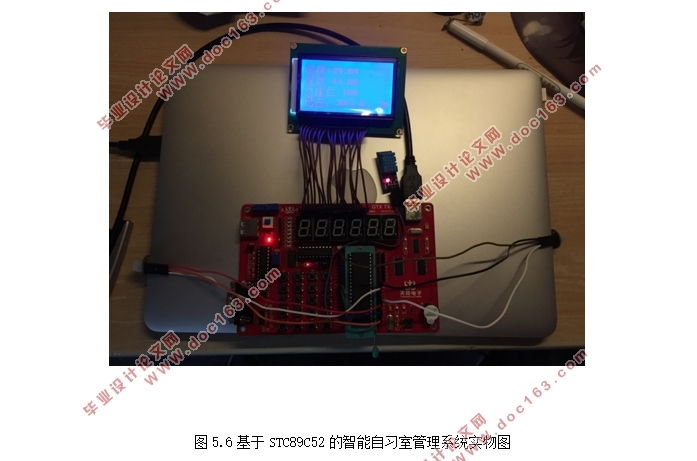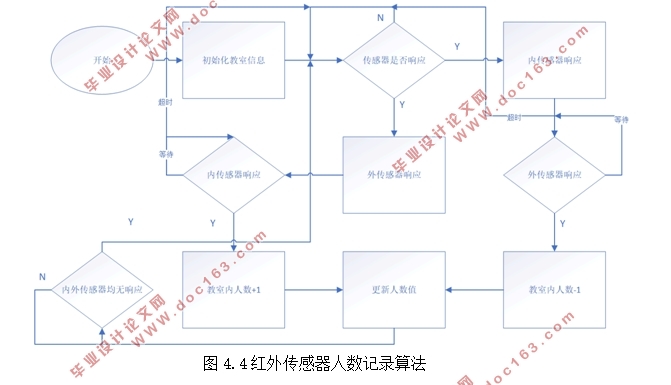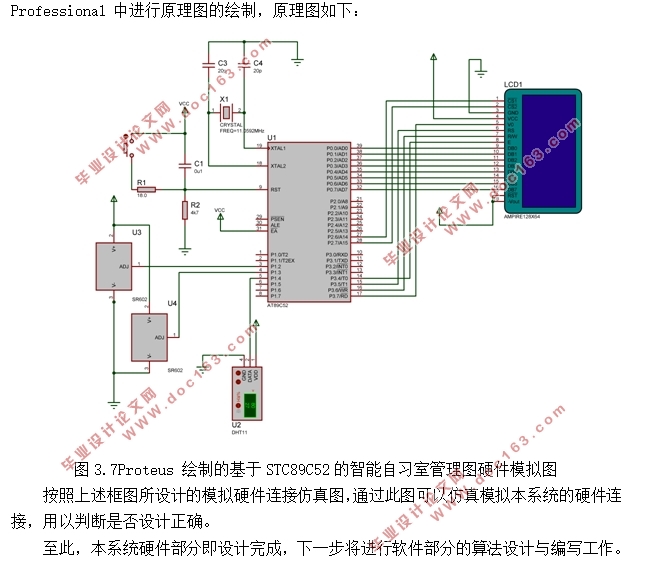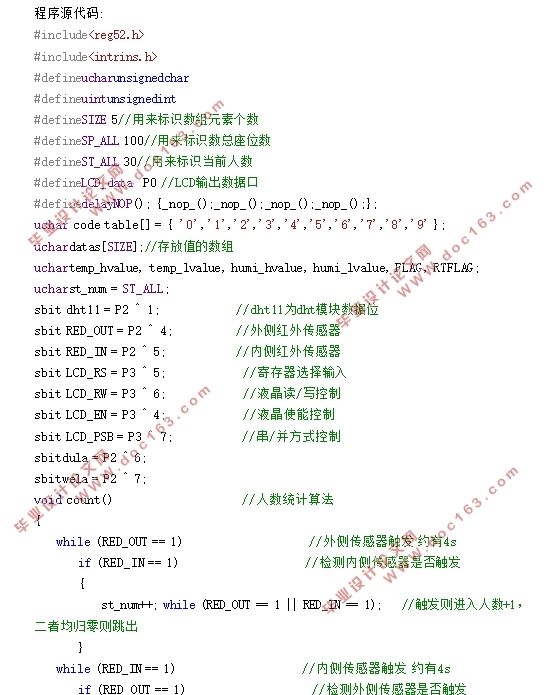基于单片机的自习室监控系统的设计

1.无需注册登录,支付后按照提示操作即可获取该资料.
2.资料以网页介绍的为准,下载后不会有水印.资料仅供学习参考之用.
密 惠 保
基于单片机的自习室监控系统的设计(任务书,开题报告,外文翻译,论文16000字)
摘要
本系统设计的目的是完成一个自习室监控系统,可以给教室里的学生提供当前教室的温度和湿度,同时也显示教室的总座位数,已占用座位数和剩余座位数。给学生提供一个更加方便和智能的自习环境。本系统使用51单片机作为载体,在此之上添加DHT11温度湿度传感器,HC-SR505红外线传感模块,使用LCD12864作为显示器,将以上元件连接到单片机最小系统之上,并通过编程让他们共同工作,组成本基于单片机的自习室监控系统。通过人数统计算法的设计和对几个传感器原理的理解,将各个独立的传感器部分组合成一个功能完整的系统。本系统已经做出实物,完成了上述全部功能,并且仍然有足够的空间允许添加新的功能和传感器,可以在此系统基础上添加更多的功能使本系统更加完善。目前已有很多智能自习室管理系统,但本系统创新性的组合了温度湿度与座位统计功能,填补了当前这方面的系统设计空白,具有较高的实用性同时也具有较强的可变空间。
关键词:
AT89C52 ,单片机 ,智能管理系统
Abstract
The purpose of this system design is to complete a self-study room monitoring system that can provide the students in the classroom with the temperature and humidity of the current classroom, as well as the total number of seats in the classroom, the seats occupied and the number of seats remaining. Provide students with a more convenient and intelligent self-study environment. This system uses 51 single-chip microcomputer as the carrier. On top of this, installed DHT11 temperature and humidity sensor and HC-SR505 infrared sensor module Uses LCD12864 as the display. The above components are connected to the minimum system of the MCU, and they are programmed to work together. Through the design of the population statistics algorithm and the understanding of several sensor’s principles, each individual sensor component is combined together into a fully functional system. The system has been made, completes all the above functions, and still has enough space to allow new functions and sensors to be added. More functions can be added to the system to make the system more perfect. At present, there are many intelligent self-study room management systems, but this system innovatively combines temperature and humidity and seat statistics functions to fill the current system design gap in this area, with high practicability and strong variable space.
[来源:http://think58.com]
Keywords:
AT89C52, MCU, intelligent management systems
[资料来源:http://think58.com]




目录
摘 要 1
Abstract 1
第1章 绪论 1 [来源:http://www.think58.com]
1.1 研究背景 1
1.2研究目的与意义 1
1.3研究内容 2
1.4 研究现状 2
1.5预期目标 3
第2章 方案选择与论证 4
2.1单片机芯片选择 4
2.2 温度湿度传感器 5
2.3 红外线传感器 6
2.3.1 HC-SR501介绍 6
2.3.2 HC-SR505介绍 7
2.3.3 SR602介绍 7
2.3.4 RS051介绍 7
2.3.5总结与比较 7
2.4 显示模块 8
2.5 硬件系统结果总结 8
第3章 硬件结构与设计 9
3.1单片机最小系统 9
3.2 温度湿度传感器DHT11硬件信息介绍 10
3.3 液晶显示器LCD12864硬件信息介绍 11
3.4 红外线传感器硬件信息介绍 12
3.4.1 SR505连接方式介绍 12
3.4.2 SR602连接方式介绍 13 [资料来源:THINK58.com]
3.5 硬件系统小结 13
第4章 软件结构与设计 15
4.1读取温度算法设计 15
4.2 测量和计算人数算法设计 16
4.3 LCD2864显示模块介绍 17
4.4小结 18
第5章 系统调试与测试 20
5.1 LCD12864显示模块调试 20
5.2 DHT11温度湿度传感器调试 20
5.3 红外传感模块调试 21
5.3.1 SR505测试 22
5.3.2 SR602 测试 23
5.4 总系统功能测试 23
5.5 小结 25
第6章 小结与讨论 26
参考文献 27
附 录 28
致 谢 36
[资料来源:http://www.THINK58.com]
